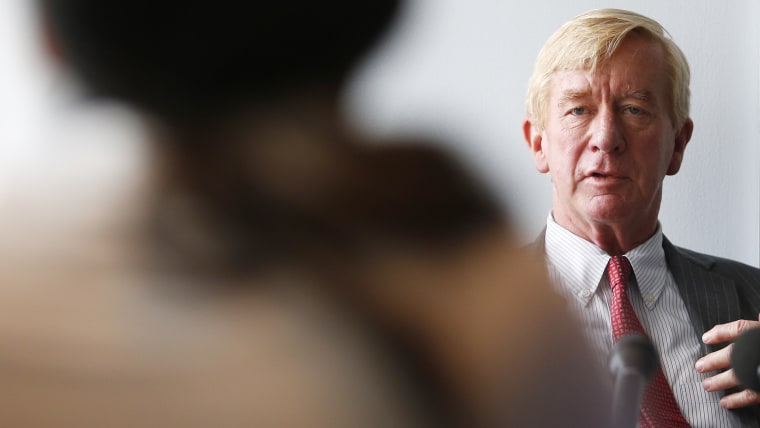Two months after launching a presidential exploratory committee, former Massachusetts Gov. Bill Weld made a rather audacious announcement yesterday: he kicked off a Republican primary challenge against the sitting president of his own party, Donald Trump.
"America deserves better," Weld's campaign announcement video said, before showing video clips of Trump mocking John McCain, imitating a disabled reporter, praising Wikileaks and the notorious "Access Hollywood" tape where he was caught on audio making inappropriate comments about women."It is time for patriotic men and women across our great nation to stand and plant a flag. It is time to return to the principles of Lincoln -- equality, dignity, and opportunity for all. There is no greater cause on earth than to preserve what truly makes America great. I am ready to lead that fight," Weld said in a statement.
By any fair measure, the former governor has traveled a non-traditional political path. In the 1990s, Weld was a popular two-term Republican governor of one of the nation's bluest states, before being tapped by a Democratic president to serve as an ambassador. Weld's nomination was blocked, and ultimately killed, by a senator from his own party -- North Carolina's Jesse Helms -- who concluded he wasn't far enough to the right.
More recently, Weld abandoned the GOP altogether and ran in 2016 as the Libertarian Party's vice presidential nominee. After Donald Trump's election, the former governor rejoined the Republican Party, and yesterday, the 73-year-old candidate decided to launch a quixotic challenge against a sitting president who enjoys strong support from his party's far-right base.
"I'm here because I think our country is in grave peril," Weld said in February after launching an exploratory committee. "I cannot sit quietly on the sidelines any longer."
One need not be a political expert to know Trump will be the overwhelming favorite in the race for the GOP nomination -- to the extent that there will even be an actual "race" -- but I'm nevertheless interested in the possibility of a sitting president having to deal with an intra-party rival.
Because the historical pattern paints an interesting picture.
In the modern presidential primary era -- beginning with the 1972 election cycle -- there have been eight presidents: Ford, Carter, Reagan, H.W. Bush, Clinton, W. Bush, Obama, and Trump. Of those eight, three lost after a single term in the White House: Ford, Carter, and H.W. Bush.
And while every cycle has its own unique quirks and qualities, Ford, Carter, and H.W. Bush each have one important thing in common: they each faced a credible primary challenge as part of their re-election campaigns, before going on to lose in the general election. Every incumbent president who didn't face an intra-party rival went on to win a second term.
All of this comes with plenty of caveats. We are, after all, talking about a fairly modest sample size. For that matter, there's a correlation/causation question that's far from clear.
That said, we've known for months that Donald Trump's political operation has worried about a primary challenge, and now it has one.
